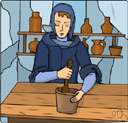serf
(redirected from Serfs)Also found in: Thesaurus, Legal, Encyclopedia.
Related to Serfs: feudal system
serf
a person in a condition of servitude; vassal, peasant
Not to be confused with:
surf – the swell of the sea breaking on shore or reefs; the foam produced by this; to ride the surf as with a surfboard; to search through a computer network for information: surf the Web
Abused, Confused, & Misused Words by Mary Embree Copyright © 2007, 2013 by Mary Embree
serf
(sûrf)n.
1. A member of the lowest feudal class, legally bound to a landed estate and required to perform labor for the lord of that estate in exchange for a personal allotment of land.
2. An agricultural laborer under various similar systems, especially in Russia and eastern Europe in the 1700s and 1800s.
3. A person in bondage or servitude.
[Middle English, from Old French, from Latin servus, slave.]
serf′dom n.
American Heritage® Dictionary of the English Language, Fifth Edition. Copyright © 2016 by Houghton Mifflin Harcourt Publishing Company. Published by Houghton Mifflin Harcourt Publishing Company. All rights reserved.
serf
(sɜːf)n
(Historical Terms) (esp in medieval Europe) an unfree person, esp one bound to the land. If his lord sold the land, the serf was passed on to the new landlord
[C15: from Old French, from Latin servus a slave; see serve]
ˈserfdom, ˈserfhood n
ˈserfˌlike adj
Collins English Dictionary – Complete and Unabridged, 12th Edition 2014 © HarperCollins Publishers 1991, 1994, 1998, 2000, 2003, 2006, 2007, 2009, 2011, 2014
serf
(sɜrf)n.
1. a person in a condition of feudal servitude, required to render services to a lord, commonly attached to the lord's land and transferred with it from one owner to another.
2. a slave.
[1475–85; < Middle French < Latin servus slave]
serf′dom, serf′hood, serf′age, n.
Random House Kernerman Webster's College Dictionary, © 2010 K Dictionaries Ltd. Copyright 2005, 1997, 1991 by Random House, Inc. All rights reserved.
ThesaurusAntonymsRelated WordsSynonymsLegend:
Switch to new thesaurus
| Noun | 1. |  serf - (Middle Ages) a person who is bound to the land and owned by the feudal lord serf - (Middle Ages) a person who is bound to the land and owned by the feudal lordEurope - the 2nd smallest continent (actually a vast peninsula of Eurasia); the British use `Europe' to refer to all of the continent except the British Isles thrall - someone held in bondage Dark Ages, Middle Ages - the period of history between classical antiquity and the Italian Renaissance |
Based on WordNet 3.0, Farlex clipart collection. © 2003-2012 Princeton University, Farlex Inc.
serf
noun vassal, servant, slave, thrall, bondsman, varlet (archaic), helot, villein, liegeman He was the son of an emancipated serf.
Collins Thesaurus of the English Language – Complete and Unabridged 2nd Edition. 2002 © HarperCollins Publishers 1995, 2002
Translations
serf
[sɜːf] N → siervo/a m/f (de la gleba)Collins Spanish Dictionary - Complete and Unabridged 8th Edition 2005 © William Collins Sons & Co. Ltd. 1971, 1988 © HarperCollins Publishers 1992, 1993, 1996, 1997, 2000, 2003, 2005
Collins English/French Electronic Resource. © HarperCollins Publishers 2005
serf
n → Leibeigene(r) mf
Collins German Dictionary – Complete and Unabridged 7th Edition 2005. © William Collins Sons & Co. Ltd. 1980 © HarperCollins Publishers 1991, 1997, 1999, 2004, 2005, 2007
Collins Italian Dictionary 1st Edition © HarperCollins Publishers 1995